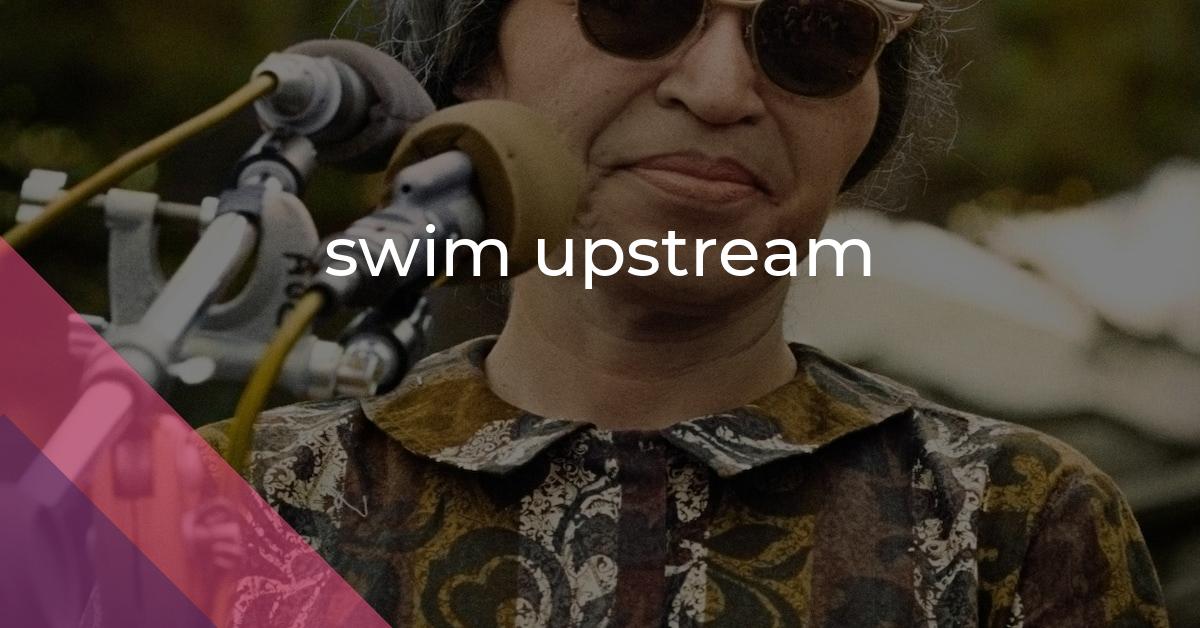swim upstream: Idiom Meaning and Origin
What does ‘swim upstream’ mean?
The idiom "swim upstream" means to go against the current or to oppose the majority opinion or prevailing trend.

Idiom Explorer
The idiom "take the plunge" means to take a significant and often risky step or action, especially when committing to something new or unknown.
The idiom "take sides" means to choose or support one person, group, or opinion over another, often in a conflict or disagreement.
The idiom "take on water" means to accumulate problems or difficulties, often referring to a situation that is deteriorating or becoming unsustainable.
The idiom "take a stand" means to publicly express one's opinion or position on a certain issue, often in a bold and assertive manner.
The idiom "swim with sharks" means to take part in a dangerous or risky situation, often involving powerful or ruthless people.
The idiom "swap horses in midstream" means to change plans or allegiances at a crucial or delicate moment, often against the advice of others.
The idiom "surf's up" means that the waves for surfing are good or that it is a good time to go surfing.
The idiom "stick one's neck out" means to take a risk or put oneself in a vulnerable position by expressing an opinion or taking action that goes against the norm or common consensus.
The idiom "stick it to the man" means to rebel against authority or challenge the status quo in a defiant or confrontational manner.
Decoding the Enigma
The idiom "swim upstream" is a common expression used in the English language. It is rooted in the behavior of fish, specifically salmon, who swim against the current when migrating to spawn. This metaphorical idiom has been in use for centuries and is widely understood by native English speakers.
When someone is described as swimming upstream, it implies that they are going against the flow or facing significant challenges. They are going against the conventional or expected path and working harder than others to achieve their goals. This idiom is often used to describe individuals who are ambitious, determined, and willing to face adversity. They exhibit resilience and perseverance in the face of obstacles. By swimming upstream, they are breaking away from the crowd, challenging norms, and charting their own course.
The idiom "swim upstream" can convey both positive and negative connotations. On one hand, it symbolizes determination, individualism, and resilience. It represents the spirit of nonconformity, as individuals defy the status quo and pursue unconventional paths. On the other hand, it can also suggest going against the grain, encountering resistance, and facing uphill battles. Nevertheless, this idiom captures the complexities of human endeavors and the relentless pursuit of goals.
One related idiom is "in the swim", which refers to being involved or connected with a particular group or activity. It can be seen as the opposite of swimming upstream, as it implies going along with the majority and being part of the flow. While swimming upstream requires breaking away from the swim, being "in the swim" means being in sync with others and following the prevailing direction.
Another related idiom is "go over to the majority", which means to align oneself with the larger group or adopt the popular opinion. This idiom contrasts with swimming upstream, as it suggests going with the majority and following the current rather than going against it. While swimming upstream requires going against the flow, going over to the majority involves joining the majority and embracing the prevailing trend.
"buck the trend" is yet another related idiom, which involves defying the prevailing trend or popular opinion. It aligns with swimming upstream in the sense that both idioms describe going against the flow. While swimming upstream focuses on the individual's effort and perseverance, bucking the trend emphasizes the act of challenging the prevailing trend or going against what is commonly accepted.
The idiom "swim with sharks" is also related to swimming upstream. It refers to being involved or associating with ruthless or aggressive individuals. It can be seen as the opposite of swimming upstream, as swimming with sharks involves going along with the powerful or influential individuals. While swimming upstream requires breaking away from the dangerous waters, swimming with sharks means navigating through them and possibly benefiting from the association.
Lastly, "fly in the face of" is an idiom related to swimming upstream. It means to openly oppose or challenge something, often in a defiant or confrontational manner. This idiom aligns with swimming upstream in the sense that both idioms describe going against the prevailing direction or opinion. While swimming upstream focuses on the individual's effort and perseverance, flying in the face of emphasizes the act of directly opposing or confronting the established norms or expectations.
Example usage
1. Despite facing numerous obstacles, she continues to swim upstream in her quest for equality.
2. The company decided to swim upstream by implementing environmentally friendly practices, even though it seemed to go against the industry norms.
3. He always swims upstream when it comes to political debates, offering unique perspectives that challenge conventional thinking.
More "Metaphorical" idioms



